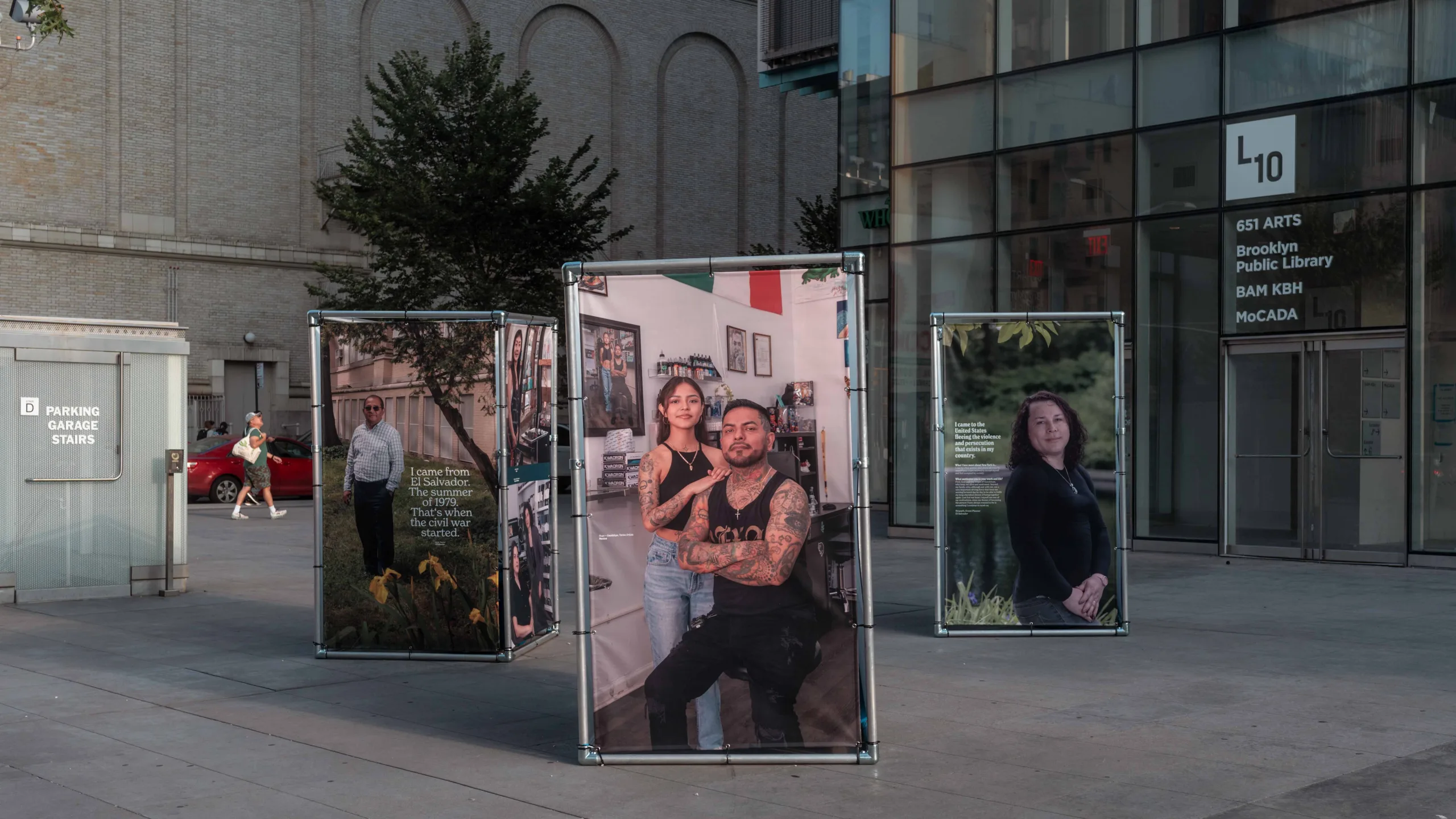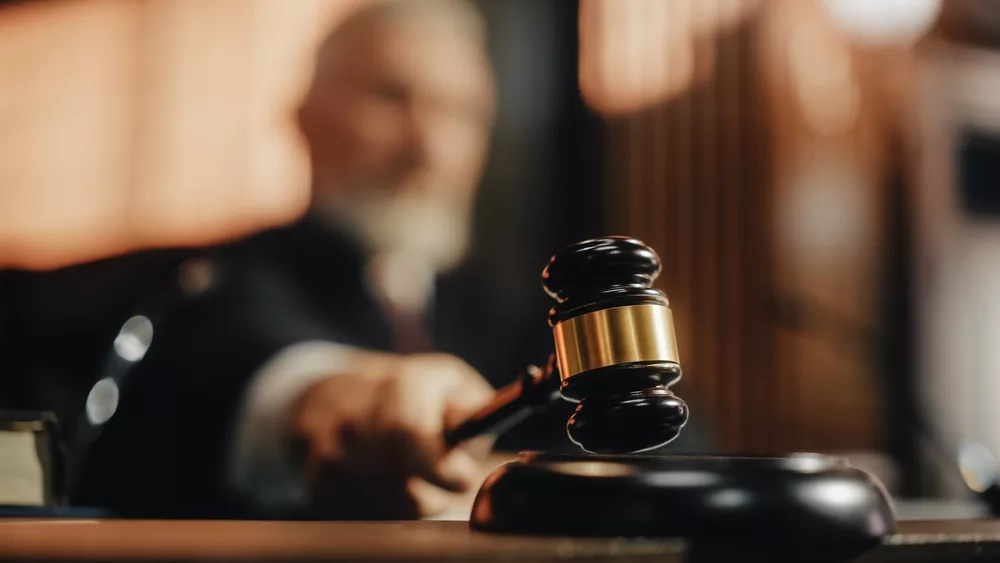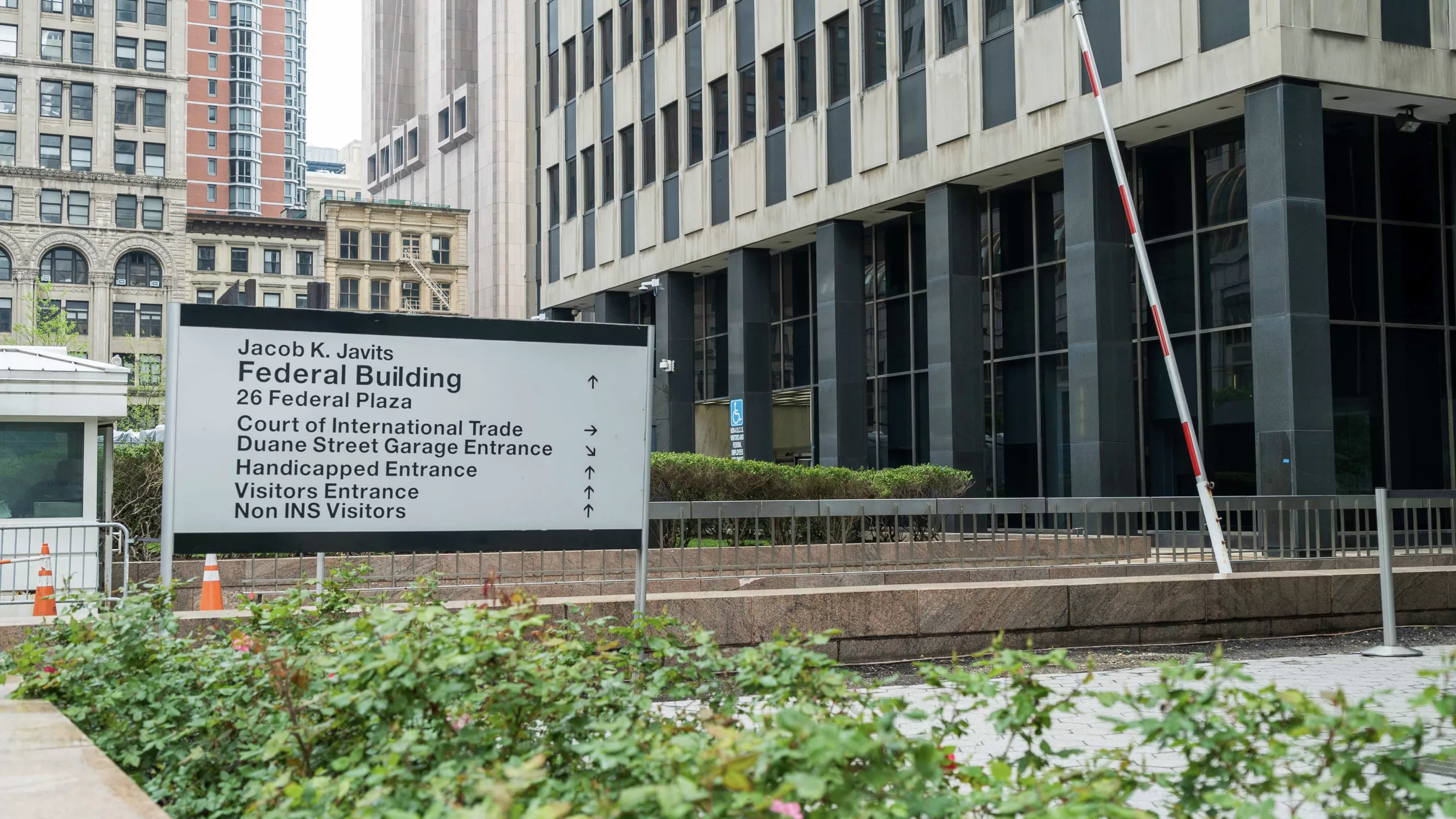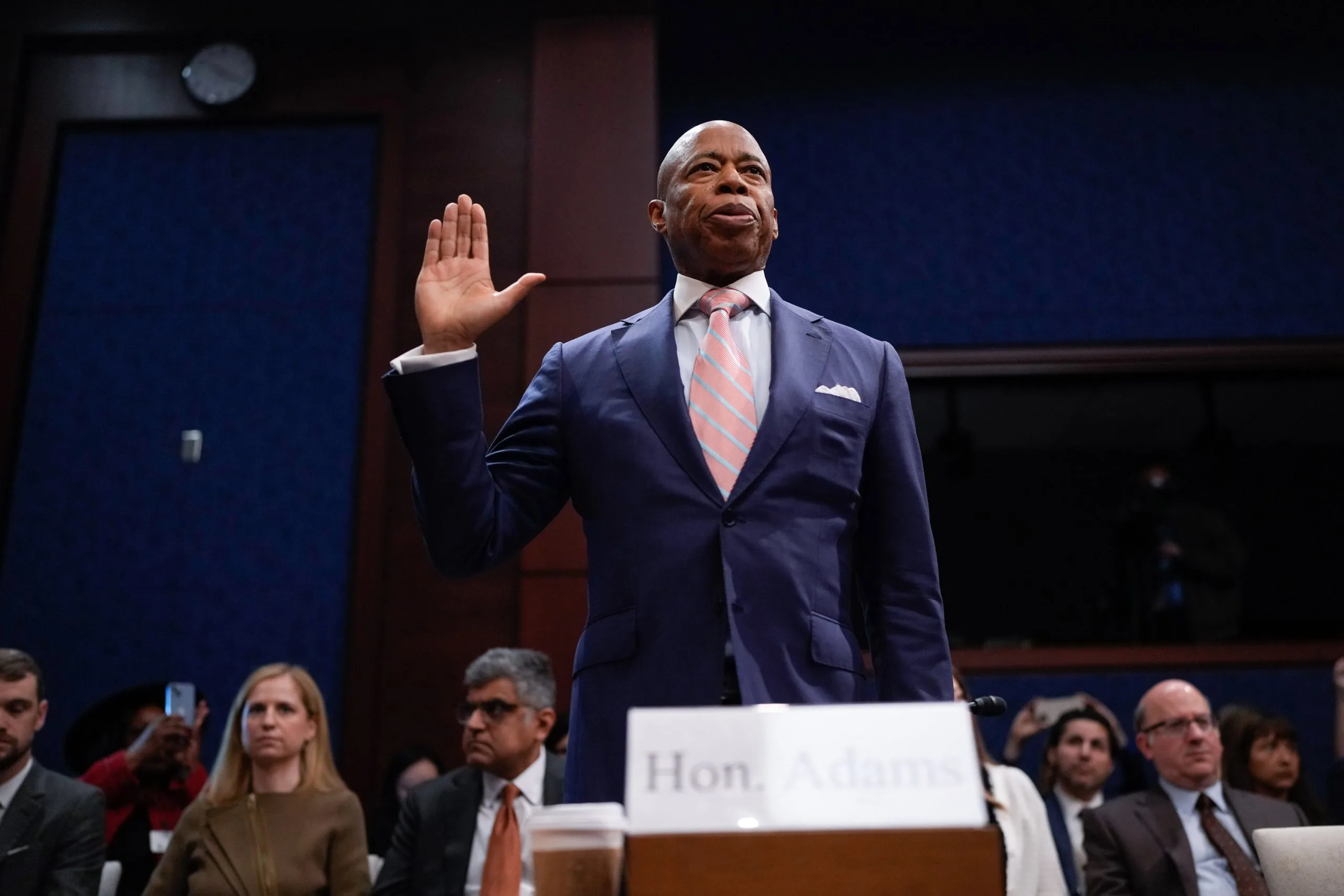Hugo Andrés Ramírez’s portrait captures him sitting on top of a leather stool inside his tattoo shop in Bushwick, Brooklyn. His tattooed arms, mapped with illustrations ranging from La Virgen de Guadalupe to a Mario Bros. mushroom, are crossed. Guadalupe, his 22-year-old daughter, stands next to him, gently placing her hands on his shoulder. Behind them are glimpses of the green, white, and red stripes of the Mexican flag, along with his sketches of prominent Mexican figures that act as a reminder of the home country they left before coming to the United States.
Sixteen years ago, Andrés Ramírez and Guadalupe came to the U.S. Today their portrait, standing 7 feet tall, is featured alongside 26 others as part of the #NewYorkProud citywide campaign launched by the New York Immigration Coalition (NYIC), and produced in collaboration with F.Y. Eye and The Opportunity Agenda, to highlight the city’s immigrant heritage and how immigrants have contributed.
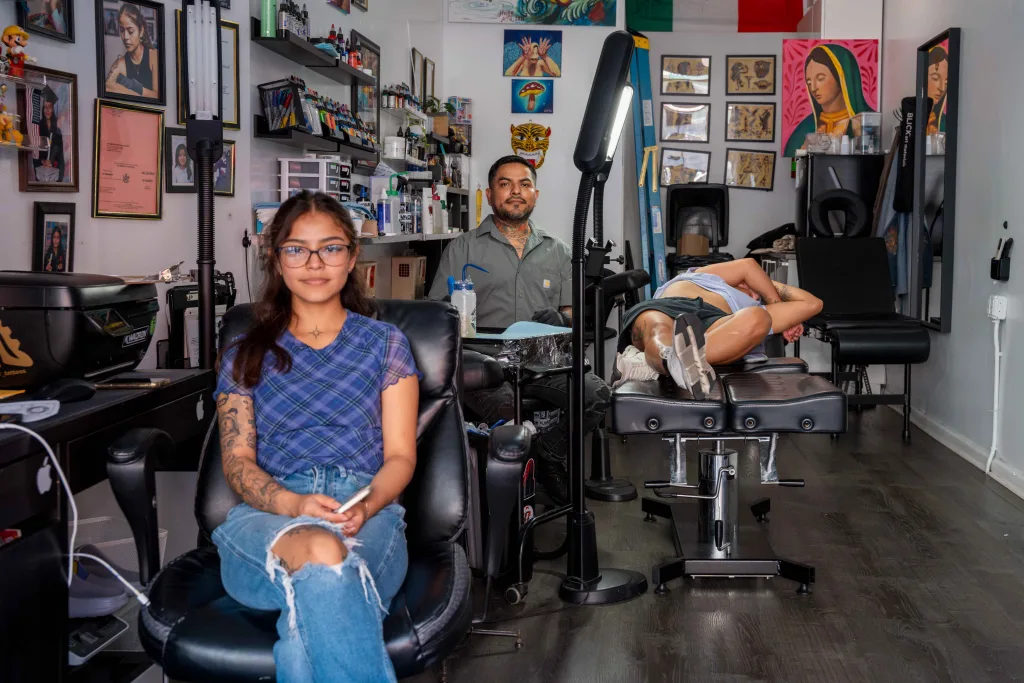
The day the exhibition was unveiled in Times Square, next to expensive billboards of The Lion King and Coca-Cola ads, Andrés Ramírez stood feet from the panel taking photos for his social media when he overheard a family passing by and questioning themselves if the people in the portraits were famous. He felt exhilarated at that moment. “It is something that, as a Latino, I feel shows that we are people who come here to work and that come here to prosper,” he said in Spanish.
The NYIC campaign features immigrants from 32 countries in the 26 portraits taken by Venezuelan-born documentary photographer Oscar B. Castillo. The photos are representative of New York City’s diversity and include a visual artist from Nigeria, a hair stylist from Japan, a musical composer from Albania, and a journalist from China, among many others.
Also read: US-Mexico Border Reinterpreted As Steel Monument in Brooklyn Bridge Park
The exhibitions were placed in South Brooklyn and Times until mid-September, with its most recent portrait launched Monday in Hunters Point South, Queens. Posters of the portraits have also been placed at more than 200 stations, LinkNYC stands, and public spaces.
This campaign arrives at a time when Donald Trump’s presidential campaign has prioritized deportation as a pillar of his campaign, with anti-immigrant rhetoric dominating his social media. Murad Awawdeh, president and CEO at the New York Immigration Coalition, said the exhibition was necessary to counter the anti-immigrant narratives in the media. In New York City, the 64,000 asylum seekers currently under the city’s care have tested the city’s identity as a melting pot of cultures and have raised questions about its sanctuary policies.
“It’s been very interesting to see people say, ‘I know that person’ or ‘that is my bus driver,’ ” said Awawdeh, who noted the photo-panel exhibitions were strategically placed in Downtown Brooklyn, a short walk where many have protested the Clinton Hill migrant shelter, and in Times Square, where more than 360,000 people enter the area every day.
But it was the city’s identity as a sanctuary that helped Andrés Ramírez become part of New York City when he first arrived from Mexico 16 years ago. He told Documented that in Mexico he was already making a living as a tattoo artist and did not imagine migrating to the U.S. until a friend invited him to come and seek opportunities. His daughter joined him, and the two started building their new lives alone.
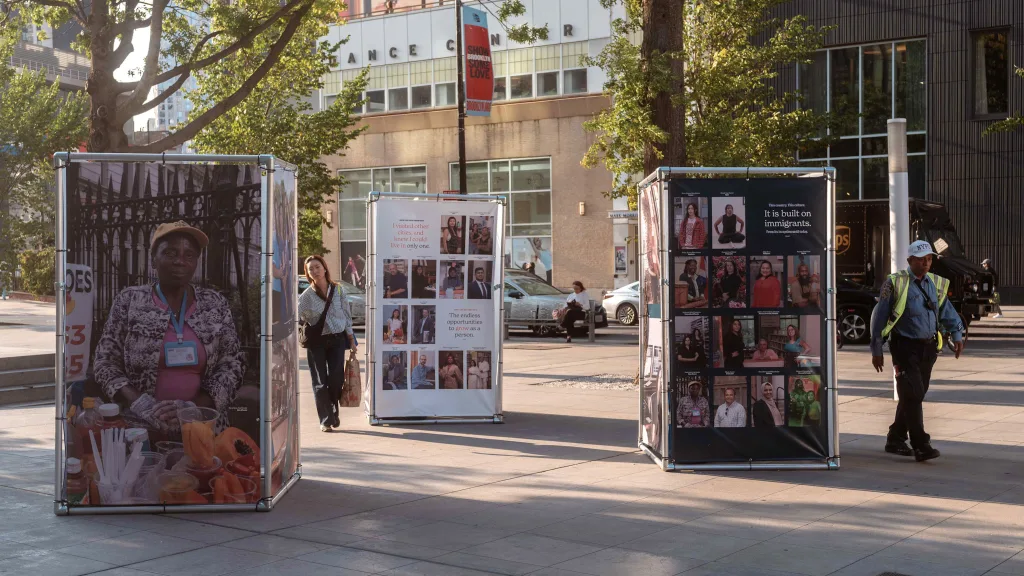
“I did not know that there were sanctuary policies to protect the migrants,” he said, remembering how he used to be nervous at the sight of the police because he thought they were immigration authorities. He added that once he learned of the city having sanctuary policies, he started to live without fear. “Little by little, I understood that there were people from all corners of the world.”
In New York City, Andrés Ramírez and his daughter learned the school system through the help of the community. When Guadalupe was 14 she began learning how to draw by observing her dad and began helping him after school. Eight years ago, he founded Xallitic Tattoos in Bushwick, where Guadalupe started working with him after obtaining her tattoo license three years ago.
“I think it was really important for people to know that immigrants are a big part of New York, and we play a big role in society,” Guadalupe said about the exhibit. “It’s not just the stuff in the news — we also contribute to the community.”
Also read: Haitians Laugh Off Dangerous Pet-Abduction Lies
Fatrin Krajka, 45, an award-winning musical composer from Albania, also participated in the campaign. “The immigration experience is unique because one has to learn and adapt,” he told Documented. “Everything is new. Everything has to be learned, behaviorally and socially. It’s a challenging experience, but all these challenges help create the persona.”
曼哈顿仇恨犯罪下降,但针对移民案件增多
Krajka, who has been living in New York for 32 years, went to 8th grade in the Bronx, LaGuardia High School of Music & Art and Performing Arts, and then at the Manhattan School of Music, where he obtained his bachelor’s degree in piano performance more than 20 years ago. He said his friends spotted his portrait in the subways and messaged him with excitement.
On Monday, the latest exhibition opened at Center Blvd & 51st Ave in Hunters Point South, Queens, the borough where more than 44% of residents are foreign-born, according to city data. “For generations, immigrants have had contributions to our city, our state, and our country, and sometimes a divisive rhetoric that we’ve been hearing from every level of government, sometimes it becomes easy to forget,” Awawdeh said. The exhibition in Queens will remain open for one month.
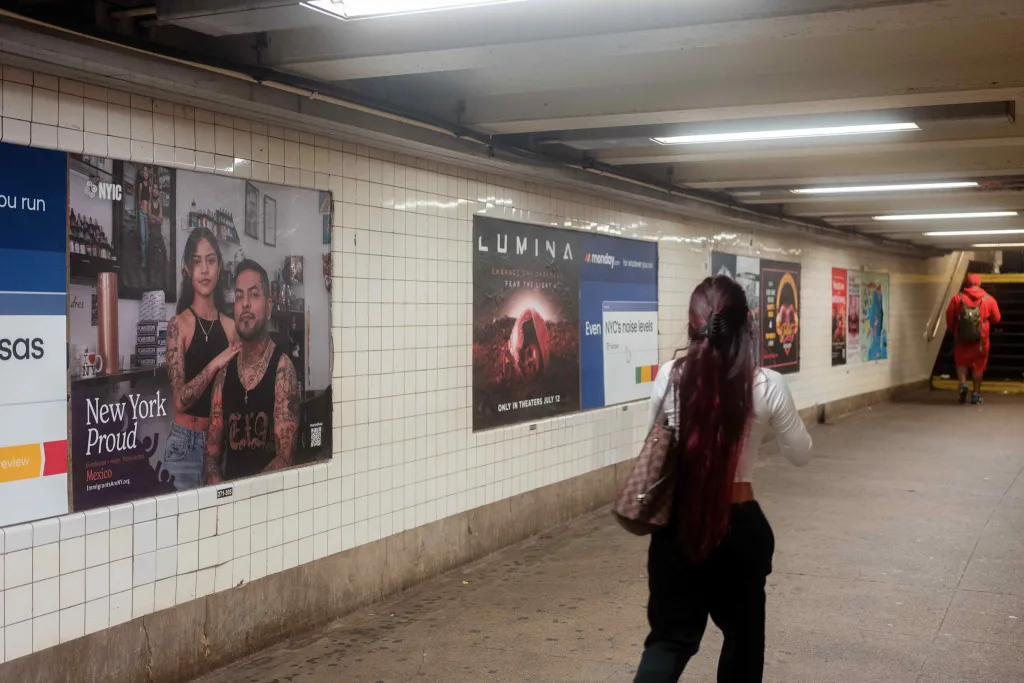
The campaign will run in New York City during the months of September and October, Awawdeh said, who noted that he was excited to help the campaign become national in cities across the country like Chicago, LA, Denver, Miami, Nashville, and beyond.
“It really is a dedication and a love letter to all of New York to come back together and to really dig in deeper into what unifies us,” Awawdeh said. “As opposed to listening to the negative rhetoric, we’re hearing from certain people on why we should be divided against each other.”
